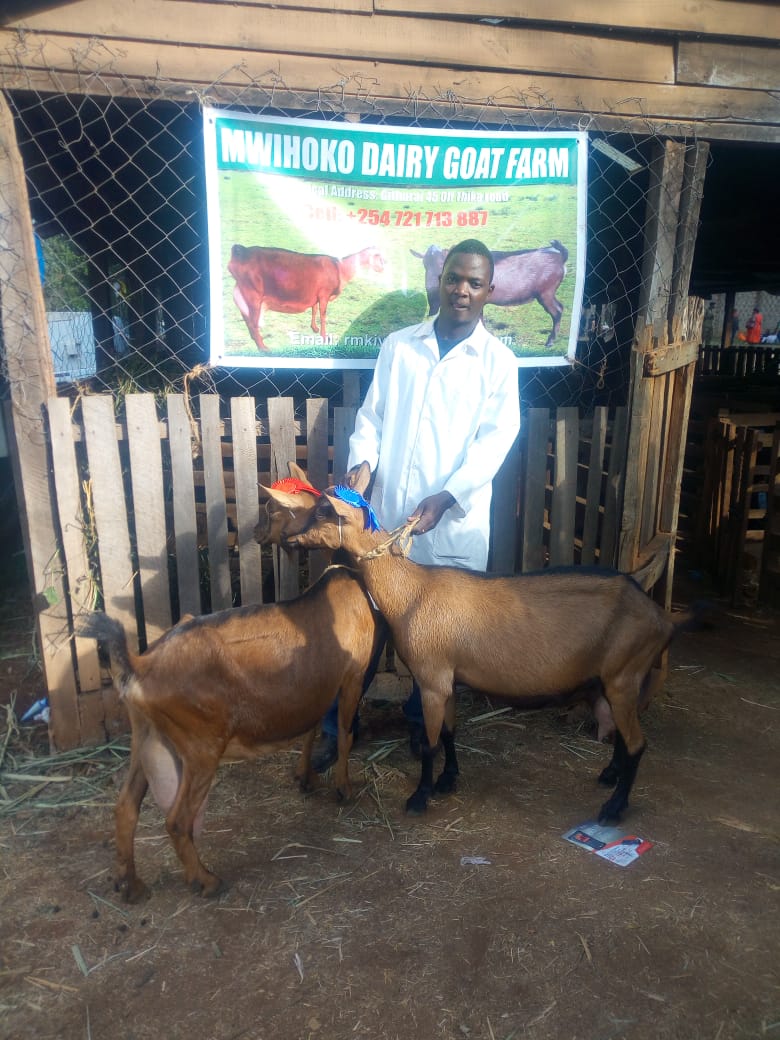 Robert Macharia showing off one of the trophy he won during a Nairobi International Trade Fair. He currently has 26 dairy goats, milking 14 of them at his farm at Githurai 45, Kiambu County. Photo Courtesy.
Robert Macharia showing off one of the trophy he won during a Nairobi International Trade Fair. He currently has 26 dairy goats, milking 14 of them at his farm at Githurai 45, Kiambu County. Photo Courtesy.
Robert Macharia Kinyua in 2014 left his job as a driver to focus on his dairy goat farming, a venture which has earned the Kiambu agro-entrepreneur two national awards; best dairy goat breeder in 2016 and the best production of dairy goats in 2017 at the Nairobi International Trade Fair.
From Sh1,500 per day he used to earn as a driver, Macharia is currently earning Sh5,000 a day from milk sales thanks to the nutrition value of the dairy product making it sought after by many especially those under medication who take the milk to improve their health.
According to a 2012 research by Rebecca Jerop on Dairy Goat Milk Consumption in Siaya County, Kenya for Egerton University, goat milk is superior to cow milk and its proteins and amino acids are more digestible and absorbed efficiently making it best for people on medication such as HIV/AIDS victims.
RELATED CONTENT: Rearing five dairy goats is 45 per cent more profitable than a dairy cow
First, Macharia worked with COMTECH Telecommunication Corporation before being retrenched in 2011 rendering him jobless something to him was a way to learn on other sources of income other than employment.
“I cannot say I was disappointed when my job ended rather it was like a wakeup call that through this I would know other beneficial activities to venture in for an honest living,” said the 39 years old farmer.
He therefore used his Sh20,000 savings to buy German Alpine dairy goat breed from a farmer in Embu who was rearing the goats. This was to help his family get nutritious milk even as he embarked on hustling for other daily needs.
RELATED CONTENT: Free-range dairy goat earns farmer over Sh90,000 a year
Soon the goat would get pregnant and the family’s only source of milk was halted forcing Macharia to spend Sh18,000 from his hustling to buy another lactating Alpine goat.
The move saw him ran out of his small savings and in 2014 when SportPesa, a sports betting platform in Kenya announced a job for a driver, Macharia applied and was fortunate to get the employment.
“I could earn Sh25,000 per month as my starting salary. This would later be increased to Sh45,000 per month making it a good source of income for a struggling farmer like me,” he said.
In May 2014 he resigned from the job to embark to his farming as he wanted to concentrate on his dairy goat venture which was now picking up given the goats had multiplied by giving birth to more kids.
“I wanted to do my own thing as I had a bigger vision of making dairy goat farming a lucrative venture in the area,” said the Kiambu County’s Githurai 45 farmer.
Today Macharia has 26 dairy goats which are all of German Alpine breed feeding them on dry matter and silage which helps him preserve green fodder for use in future.
“I am an urban farmer who is not easily accessed to local fodder that’s why I opt for dry matter and silage. At times I hire a truck to Naivasha at a cost of Sh20,000 per trip to purchase hay and grass which they also feed well. One trip has 200 bales that feed the goats for six months,” he said.
Out of the 26 goat, the farmer is currently milking 14 which gives an average of 25 litres of milk per day. He sells a litre of milk at Sh200 to his customers, mostly on medical prescription from a doctor to take goat milk for their health.
“In a single day I can rake not less than Sh5,000 from the milk sales and sometimes I run out of stock due to many orders from my customers,” said Macharia.
RELATED CONTENT: Dairy goat farm changing farmers’ lives through trainings

Robert Macharia, holding his two dairy goats during a past Nairobi International Trade Fair. Photo courtesy.
It is out of this high demand that in August 2017 he registered his farm, Mwihoko Dairy Goat Farm situated at Mwihoko along Thika Supper Highway as a way to authoritatively train farmers and bring together other young people in dairy goat farming to meet the production demand.
According to a 2011 case study by Juliah Wanjiru Kinyua on Factors Influencing Productivity of Dairy Goats in Laikipia for the University of Nairobi, with human population projected to reach 58 million by 2030 in Kenya, the total milk demand projects to 12.76 billion litres.
What is now keeping him progressing is that he loves goats and loves dairy goat farming.
“I am inspired because I love farming and it is what keeps my family going and pays for my children’s education,” said the father of five.
RELATED CONTENT: Small-holder dairy goat farmers to feed Djibouti market
His main focus now is how he can grow the business to help eradicate poverty in the surrounding society by helping others who want to start off in dairy goat farming with proper advice and training.
“As compared to other forms of livestock keeping, dairy goat farming requires minimal space with goat products having good returns, consumes less time and have available and ready market.”
Besides Mwihoko Dairy Goat Farm, Kinyua runs Mwihoko Garbage Collectors, a garbage collection company which has 15 employees.
















Comments powered by CComment